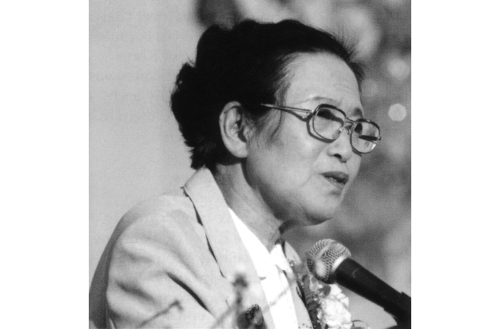So far, we have pointed out how Unification theology and other contemporary trends in Christian thought converge.
The next step seems quite astounding. The Divine Principle suggests that the God-chosen human instrument for the creation of the age-to-come will appear in Korea.
This assertion may be difficult to accept at first and has repeatedly been ridiculed. Isn't Divine Principle simply a product of naive Korean nationalism, as critics have alleged?
To understand this part of Unification theology, it may help to recall a few basic Biblical teachings. First, God is the creator of all men, so no nation is automatically unworthy of being His elect agent.
Second, ever since St. Paul's time, Christians have generally refused to restrict God's chosen people to the Jews. Third, if God is sovereign, then He is free to do as He pleases to realize His will. Barth especially has reminded us of this divine freedom.
All of these fundamental Judeo-Christian affirmations should prove that it is not intrinsically impossible for God to choose a Korean.
Now, if God is at liberty to select whom He wishes as the central figure in the coming age, do we find any clues as to His possible choice? For many centuries, civilization has been moving westward: The ancient empires of the Near East were replaced by the Roman Empire.
This was in turn succeeded by the great powers of Western Europe, which in time has led to the dominant position now held by the United States. If this flow of civilization continues, the next focal point should be somewhere in East Asia. Such a conclusion seems not unreasonable.
Consequently, students of political trends today often predict that, shortly, Japan or China could dominate world affairs much as the United States has done since 1917. But Unification theology points out that neither China nor Japan has the necessary spiritual foundation to become a new Israel.
If God needs a strong Christian base for a new chosen people, such a qualification among East Asians can be found only in Korea. 36
What are the special characteristics of Korea that make it a prime candidate for divine election?
The Divine Principle argues its case mainly upon rational grounds. Historically, many nations have claimed to be God's chosen people. The Japanese believe they are descendants of the sun goddess.
The Chinese say that their nation is located at the center of the universe. Russians assert that Moscow is destined to be the Third Rome. Germans in World War I used to sing "Germany over everybody," because the blue-eyed, blond Nordic people were supposed to be the master race.
The same is true of Egyptians, Assyrians, Indians, Greeks, Englishmen, Frenchmen, Americans, and others. Hence, Koreans are no different from numerous people when they claim that God has chosen them to be His special instruments. How does Korea resemble ancient Israel, which did uniquely serve God?
Like the Biblical Hebrews, Korea has laid a nationwide foundation for restoration by indemnity. That is, Korea has carried out the role of God's suffering servant. Because both countries are located at geographical crossroads, they have suffered equally from foreign aggressors.
Thus, the Korean character has frequently been tested and refined in the fires of alien conquest and persecution. As a result, Koreans greatly resemble the Biblical Jews in the depth of their national piety and their unconquerable will to survive.
Without an invincible faith in themselves and firm reliance upon religious support, Koreans would long ago have become one of history's numerous "lost" peoples. How often have they known what it means to carry a cross!
37 and 3737, the interpretations of Hebrew history given by the Biblical royal annalists and chroniclers.
Like the Biblical historians, Ilyon compiles the ancient folktales of his country and adds to them memorable stories of its kings, holy men, and heroes. Like the interprets his nation's past from a religious perspective, emphasizing the supernatural wonders of earlier times.
For him, as for the Yahwist and Deuteronomic historians, the nation's piety is considered the most important feature of its life. In Ilyon's opinion, Korean history should be remembered because it reveals the constant interaction of the sacred and secular, truly "salvation-history" resembling that found in Scripture.
Moreover, scriptural exegetes like Philo, Origen, and Augustine have noted the mystical significance of certain numbers in the Biblical theology of history. 38
Of special prominence is the number 40, as the Divine Principle points out: the rains causing the flood in Noah's time lasted 40 days; the Hebrews spent 40 years in the desert; the Babylonian captivity covered 40 years; Jesus stayed 40 days in the wilderness overcoming Satan's temptations.
Forty then has something to do with the Biblical plan of salvation-history. For Divine Principletruly, it signifies a period of indemnity, which is preparation for some great mission or divine blessing.
Is it then a mere coincidence that Korea suffered about 40 years of Japanese oppression as spiritual preparation for its role in modern times? If Christians believe that the Bible throws light upon God's redemptive activity, then this strange parallel between ancient Israel and modern Korea should cause us to ponder. Is there not a real possibility that Korea could provide "light for the Gentiles" in our day?
In 1905, Marquis Ito of Japan and Wan-yong Lee, the pro-Japanese Korean Minister of Education, signed the Eul-sa treaty, in which Korea was robbed of its sovereignty and made a Nipponese protectorate.
By 1910, the Japanese annexed Korea by force. Queen Min was assassinated, and all prominent patriots were imprisoned or killed; yet Koreans never submitted to the loss of their traditional political freedoms. In March 1919, at Pagoda Park in Seoul, a group of distinguished Koreans publicly called for independence from Japan, but the national freedom movement was ruthlessly crushed by the military occupation authorities.
Many Korean freedom fighters fled to Manchuria, where they continued to agitate for independence. To counter this popular underground movement within the country and the influence of refugees abroad, the Japanese instituted a bloody reign of terror and a repressive colonial policy which continued until Japan's defeat in World War II. 39
Although notable Buddhist leaders and spokesmen for the native Chondogyo religion 40supported the 1919 independence movement, Christians often bore the brunt of Japanese persecution because missionaries were able to publicize the Korean cause in America and Britain.
It is therefore no exaggeration to compare the 40 years of Christian persecution (1905-45) to the 400 years the Hebrews suffered in Egyptian bondage or the 400 years Christians were sporadically persecuted by pagan Rome. In this respect, surely Korea could be called "the third Israel."
According to Divine Principle, God's special agent for carrying out His redemptive purpose in our day has to be on the front line 41between God's forces and the armed might of His satanic adversaries.
Repeatedly, the first Israel confronted God's enemies: Egypt, Assyria, Babylon, and the pagan Graeco-Roman world. Since World War 11, Korea has likewise been tragically divided by the rival forces of Communist tyranny and the defenders of democracy. Consequently, the Divine Principle refers to Korea as a sacrificial victim offered up on God's altar of universal restoration.
Such an idea may be extremely difficult for a non-Korean to accept.
Why so arbitrarily localize God's redemptive action?
What makes Korea more valuable in God's eyes than other victims of Marxist tyranny like China, Tibet, Germany, Hungary, Vietnam, or Cambodia?
Two comments should be made regarding such questions. First, the Divine Principle does not promulgate the idea of a superior nation or a master race. All men are equal in God's sight because all are created to be His children.
Hence, Korea today and ancient Israel do not hold an intrinsically higher status. Israel in the past and Korea in our time are merely functionally elected. They are exalted or set apart from others to serve all mankind.
Second, the Divine Principle's concept of the chosen nation is very different from the ordinary varieties of nationalism. Commonly, nationalists give supreme and unquestioned loyalty to their country, right or wrong.
But all nations, even the chosen people, must be subject to the higher sovereignty of God. Nowhere is Korea given the divine right to rule the world in a political, economic, or cultural sense.
To carry out a special mission in God's providence of universal restoration, a nation must tread a sacrificial path marked with blood, sweat, and tears. That is, a chosen people have to discover the sorrowing heart of God as Israel did.
God has grieved deeply, brokenhearted by the waywardness of His children, so any nation that intends to serve Him must realize that struggle against Satan inevitably results in a historical course of untold misery.
Only by walking the path of affliction, as God Himself does, can a people comprehend the parental heart of God and thereby be prepared to serve as His special instrument.
How, asks the Divine Principle, can we expect to be always favored with good fortune if our purpose is to manifest God's aching heart? How can an affluent, comfortable, and complacent nation be aware of what it means to be the Creator of an ungrateful and rebellious world?
Nevertheless, suffering by itself is not necessarily virtuous. Oftentimes,s defeat can only break a nation's will and lead to despair. Like the Biblical Hebrews, Koreans have been invaded by many aggressors, yet they have survived because of their indomitable religious faith. In the spirit of Job, they have relied upon God's essential justice and goodness despite almost intolerable misfortunes.
The fundamental characteristics of Korea's 4500-year-old piety could also be of priceless value if God decided to choose Korea for a dispensational mission. Never have Koreans been content to restrict their faith to an animistic belief in the divinity manifested in nature.
From the beginning, Koreans have stressed the concern of the spiritual world for man's practical welfare. It was therefore easy for Koreans to appreciate the ethical teachings of Confucianism because they already treasured noble human qualities like loyalty, filial piety, and righteousness.
At the same time, ancient Koreans were conscious of their spiritual obligations to the transcendent God. Hence, Buddhist missionaries were eagerly welcomed when they taught the value of meditation, tranquility, and serenity.
Shamanic theism, Confucian social ethics, and Buddhist spirituality together provided fertile soil for the planting of the Gospel in the last century. Consequently, Protestant and Catholic missionaries have praised Koreans for their warm, fervent Christianity.
In addition to these well-known virtues of the Korean character, the Divine Principle reminds us that spiritually gifted Koreans have repeatedly received messages from above that their nation would have a unique role in the realization of God's plan for mankind.
During all of their bitter political travails, the Korean common people were consoled by messianic hopes. How natural it was then for the Unification movement to arise in the nation so carefully prepared for its teachings.
36 The Philippines is the only other strong Christian nation in East Asia. However, that country's religion is largely a Spanish (and American) import, it would seem.
37 The Samguk Yusa (E.1 1972).
38 Cf. V. E. Hopper, Medieval Number Symbolism (1969), pp. 69-88.
39 Cf. EA. McKenzie, Korea's Fight for Freedom (1920).
40 B. Weems, Reform, Rebellion and the Heavenly Way (1966).
41 Divine Principle, pp. 523-525.



